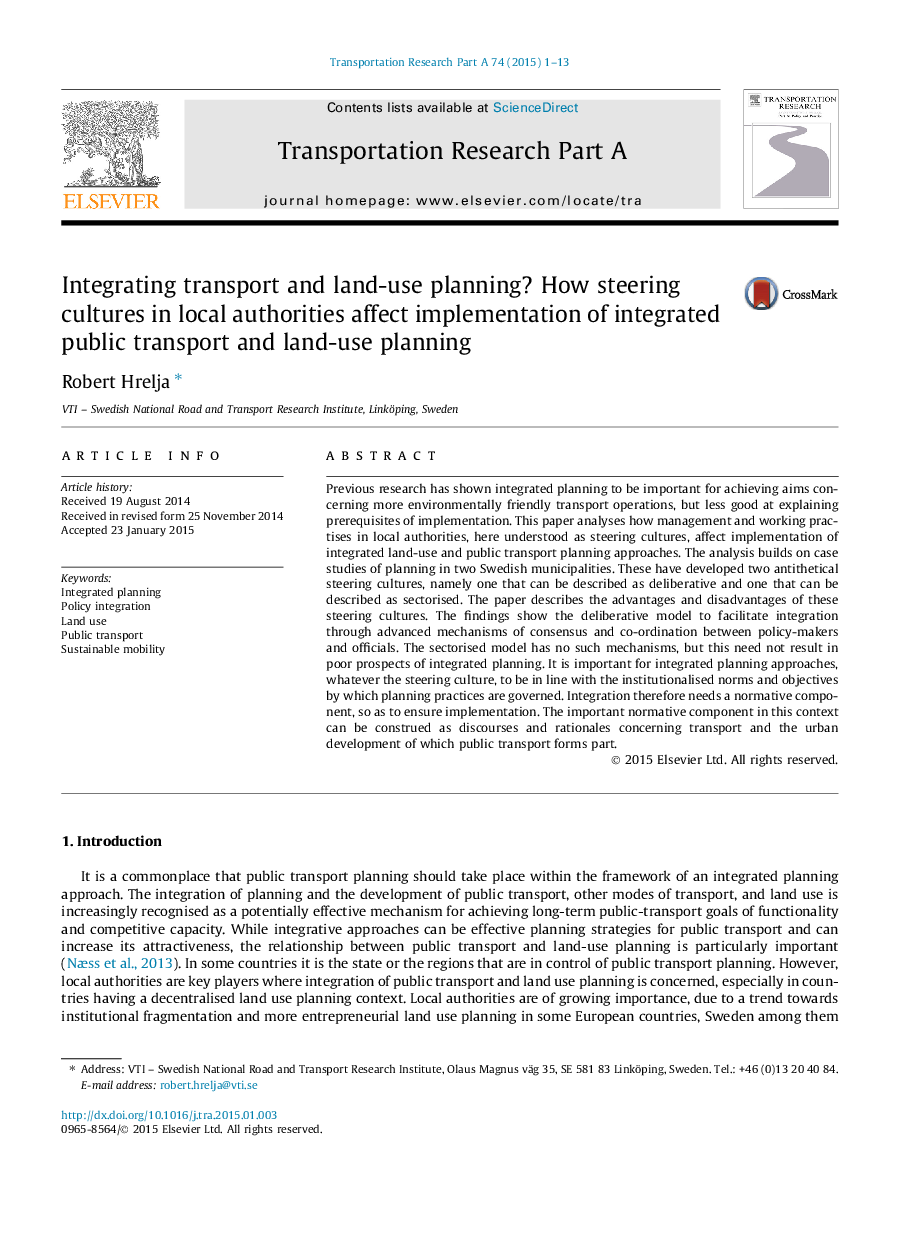| کد مقاله | کد نشریه | سال انتشار | مقاله انگلیسی | نسخه تمام متن |
|---|---|---|---|---|
| 6781306 | 533604 | 2015 | 13 صفحه PDF | دانلود رایگان |
عنوان انگلیسی مقاله ISI
Integrating transport and land-use planning? How steering cultures in local authorities affect implementation of integrated public transport and land-use planning
ترجمه فارسی عنوان
ادغام برنامه ریزی حمل و نقل و استفاده از زمین؟ چگونه فرهنگ فرماندهی در مقامات محلی بر اجرای یکپارچه حمل و نقل عمومی و برنامه ریزی استفاده از زمین تاثیر می گذارد
دانلود مقاله + سفارش ترجمه
دانلود مقاله ISI انگلیسی
رایگان برای ایرانیان
کلمات کلیدی
برنامه ریزی یکپارچه یکپارچگی سیاست، استفاده از زمین، حمل و نقل عمومی، تحرک پایدار،
ترجمه چکیده
تحقیقات قبلی نشان داده است که برنامه ریزی یکپارچه برای دستیابی به اهداف مربوط به عملیات حمل و نقل مناسب تر از محیط زیست اهمیت دارد، اما در توضیح پیش نیاز های اجرایی کمتر مورد توجه است. این مقاله به بررسی نحوه مدیریت و شیوه های کار در مقامات محلی، که در اینجا به عنوان فرهنگ فرمان شناخته می شود، بر اجرای برنامه های یکپارچه استفاده از زمین و حمل و نقل عمومی تأثیر می گذارد. این تجزیه و تحلیل بر اساس مطالعات موردی برنامه ریزی در دو شهرداری سوئد است. اینها دو فرهنگ فرماندهی ضدتشقی را توسعه داده اند، یعنی یک که می تواند به عنوان مشورتی و یکی که می تواند به عنوان بخش بندی شده توصیف شود. این مقاله مزایا و معایب این فرهنگ فرمان را توصیف می کند. یافته ها نشان می دهد مدل مشورتی برای تسهیل ادغام با استفاده از مکانیزم های پیشرفته اجماع و هماهنگی بین سیاست گذاران و مقامات. مدل بخشبندی چنین مکانیزمی ندارد، اما این نیازی به چشم انداز ضعیف برنامه ریزی مجتمع نیست. برای رویکردهای برنامه ریزی یکپارچه، هر کدام از فرهنگ فرماندهی مهم است که با هنجارها و اهداف نهادی که توسط شیوه های برنامه ریزی اداره می شوند، متناسب باشد. بنابراین یکپارچگی به یک مولفه هنجاری نیاز دارد، تا اطمینان حاصل شود. جزء هنجاری مهم در این زمینه می تواند به عنوان گفتمان و منطقی در مورد حمل و نقل و تفکر شهری توسعه یابد که حمل و نقل عمومی بخشی از آن است.
موضوعات مرتبط
مهندسی و علوم پایه
سایر رشته های مهندسی
مهندسی عمران و سازه
چکیده انگلیسی
Previous research has shown integrated planning to be important for achieving aims concerning more environmentally friendly transport operations, but less good at explaining prerequisites of implementation. This paper analyses how management and working practises in local authorities, here understood as steering cultures, affect implementation of integrated land-use and public transport planning approaches. The analysis builds on case studies of planning in two Swedish municipalities. These have developed two antithetical steering cultures, namely one that can be described as deliberative and one that can be described as sectorised. The paper describes the advantages and disadvantages of these steering cultures. The findings show the deliberative model to facilitate integration through advanced mechanisms of consensus and co-ordination between policy-makers and officials. The sectorised model has no such mechanisms, but this need not result in poor prospects of integrated planning. It is important for integrated planning approaches, whatever the steering culture, to be in line with the institutionalised norms and objectives by which planning practices are governed. Integration therefore needs a normative component, so as to ensure implementation. The important normative component in this context can be construed as discourses and rationales concerning transport and the urban development of which public transport forms part.
ناشر
Database: Elsevier - ScienceDirect (ساینس دایرکت)
Journal: Transportation Research Part A: Policy and Practice - Volume 74, April 2015, Pages 1-13
Journal: Transportation Research Part A: Policy and Practice - Volume 74, April 2015, Pages 1-13
نویسندگان
Robert Hrelja,
